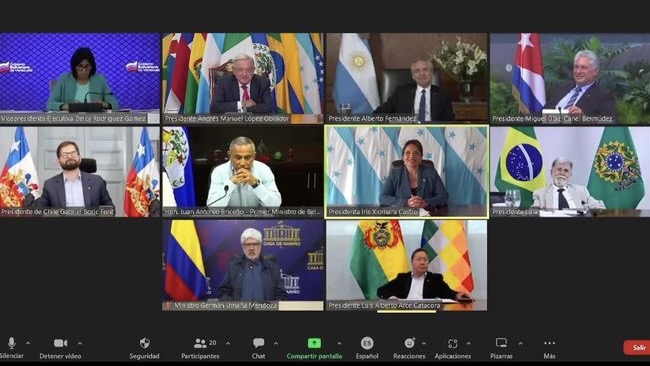On Wednesday April 5, the Heads of State and Government of eleven Latin American and Caribbean countries took part in a virtual anti-inflation summit, called for by Mexican President Andrés Manuel López Obrador (AMLO). The summit sought to form an alliance to jointly face the inflation crisis affecting the region.
In addition to President AMLO, Argentine President Alberto Fernández, Bolivian President Luis Arce, Brazilian President Luiz Inácio Lula da Silva, Chilean President Gabriel Boric, Cuban President Miguel Díaz-Canel, Honduran President Xiomara Castro, Venezuelan Vice-President Delcy Rodríguez, Prime Minister of Belize Juan Antonio Briceño, Minister of Commerce, Industry and Tourism of Colombia Germán Umaña Mendoza, and Minister of Finance of Saint Vincent and the Grenadines Camillo Gonsalves, joined the regional meeting. These countries are members of the Alliance of Latin American and Caribbean Countries against Inflation (APALCI).
During the meeting, the political leaders discussed joint solutions to face high food prices and shortages in the region, as well as to strengthen regional integration and trade. They expressed their will to unite efforts to guarantee economic growth and development that promotes inclusion, equity and sustainability of food and nutrition security for people, and to urgently and jointly face inflationary pressures on the basic food basket and essential goods and services. They also committed to strengthening economies and productive sectors through inclusion, solidarity and international cooperation.
Presidential declaration
In this regard, the leaders signed a joint declaration and agreed on actions to “advance the definition of trade facilities as well as logistical and financial measures that will allow the exchange of basic food products and essential goods under better conditions, with the priority of lowering the costs of such products for the poorest and most vulnerable population.”
According to the declaration issued by the APALCI, the leaders also endorsed the creation of a Technical Working Group, made up of government representatives from each country to further the development of regional cooperation measures. The group will also work on charting out a plan of action to facilitate trade that is able to address the challenge of the high prices of basic consumer products.
There were also agreements made to facilitate the trade of chemical and organic fertilizers, in accordance with the multilateral, regional, sub-regional and bilateral agreements that bind each country. These agreements also seek to contribute to the food and nutrition security of each country, and promote technology transfer and cooperation in capacity building.
The Technical Working Group will carry out a feasibility analysis for the development of better logistical conditions as well as a harmonization framework for sanitary and phytosanitary regulations and certifications. It will recommend the adoption of measures to improve the efficiency of the entry and exit of products through ports and borders, and the exchange of intermediate inputs, machinery and technology for the benefit of agricultural productivity.
The leaders also agreed to promote measures aimed at facilitating access to credit at the international level, and to increase multilateral financing for agricultural, agro-industrial, and infrastructure projects for the transport of goods.
They also committed to coordinating efforts with producers, buyers, transporters, and logistics operators from the private sector and other economic actors to follow up on the agreements of this Summit and its results.
The leaders pledged to continue working on the commitment established during the 7th Summit of the Community of Latin American and Caribbean States (CELAC), held on January 24, 2023, in Buenos Aires, Argentina, based on food systems and traditional and sustainable knowledge and practices, as well as within the framework of the SAN CELAC 2025 plan for food and nutritional security and the eradication of hunger.
They expressed their intention to invite other countries of the region to join this initiative.
During the summit, the leaders also agreed to hold a meeting with the business sectors, including family and small-scale agriculture organizations, on May 6 and 7, in Cancun, Mexico.





